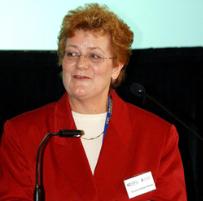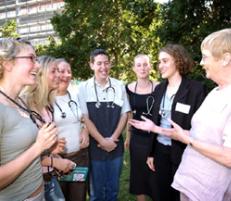SCU chief welcomes CQU nursing input
Published on 13 August, 2003
The University of the Sunshine Coast and Central Queensland University (CQU) have celebrated the return of nursing education to the Sunshine Coast after a 10-year absence.
The first 31 students to be enrolled in the Bachelor of Health (Nursing) degree at the University of the Sunshine Coast were recently (August 5) joined by their families, staff and more than 100 guests for the official ceremony at the Sippy Downs campus.
Nursing education on the Sunshine Coast ceased in 1993 when the final hospital-trained nurses graduated from Nambour General Hospital. Until its recent re-introduction, the nearest locations for Sunshine Coast residents to undertake their pre-registration training were either Brisbane or Hervey Bay.
The need to make long daily journeys or even re-locate out of the region has now been eased thanks to the unique time and cost-saving collaboration between CQU and the University of the Sunshine Coast.
The universities have agreed the program will be jointly taught. CQU, has considerable experience in nursing education programs while the University of the Sunshine Coast has specialists in biomedical science.
 A number of public and private hospitals and health care institutions also played a significant part in the rapid establishment of the program.
A number of public and private hospitals and health care institutions also played a significant part in the rapid establishment of the program.
As a result of the co-operative spirit, the initial intake of students began their course work little more than a year after the idea of launching undergraduate nursing education on the Sunshine Coast was first discussed.
Professor Paul Clark , Acting Vice-Chancellor of USC said that "with a lot of goodwill, staff from the two universities and the health care providers solved problems and issues, cooperated wholeheartedly and met the target".
"When two of the students spoke at the celebration to a large audience, we were spellbound by the articulate way they described how they felt when the opportunity arose for them to study nursing on the Sunshine Coast.
"They grasped the opportunity with both hands and I'm sure they will greatly enjoy their courses and their subsequent nursing careers.
"The students even received engraved stethoscopes to help them on their way. We were aware of the very strong demand for nursing education and we realised the solution lay in forming a partnership with CQU and working with the region’s health care providers,” Professor Clark said.
“As a result, we have been able to offer a nursing program on the Sunshine Coast much earlier, and at a lower cost, than if we had worked on our own.” The Sunshine Coast is one of the fastest growing regions in Australia and Professor Clark said the requirement for more hospitals and health care facilities would inevitably lead to a need for more nursing staff.
“While we are all delighted by the successful launch of nursing education here, we are also very conscious of the need to build on that success and try to secure government funding and support for even more places in future years,” said Professor Clark.
Central Queensland University Vice-Chancellor and President, Professor Glenice Hancock, said CQU had developed a strong nursing education presence in Queensland, with undergraduate pre-registration programs commencing in 1990.
In responding to the needs of its communities and with the support of those communities, the program was successfully introduced in Bundaberg in 1997 and Mackay in 1999. One of the program's key strengths has been CQU's ability to provide students with a variety of study modes in addition to an extensive range of clinical placement options available throughout Queensland.
Professor Hancock said she was pleased that the University of the Sunshine Coast had approached CQU to collaborate on the establishment of the program on the Sunshine Coast “as both institutions are young and enthusiastic and take pride in their ability to respond to the needs of their communities.” “CQU's experience in working with the University of the Sunshine Coast has been superb from the ground up, from the top down and across all departments involved in making this work,” Professor Hancock said. “People have bent over backwards to help.” Mr Ross MacDonald, Executive Director Nursing Services for the Sunshine Coast Health Service District, expressed his strong support for the new program but said there was still much to achieve.
“This celebration is just the beginning,” he said. “This year we have been able to initiate the program through the partnership of two universities but even this great effort does not meet the demand for places from prospective students nor the demand from industry for registered nurses. “With the announcement from the Federal Minister of additional nursing places we must secure for the Sunshine Coast an allocation of some of those places to meet both student and industry demand.” CQU senior lecturer Dr Leonie Mosel Williams said the first intake of students had made an impressive start. “They have set a high standard for those who will follow,” she said. “These are highly motivated students who have a zest for learning and a genuine enthusiasm for nursing.” Dr Williams added the support and encouragement from practicing nurses on the Sunshine Coast had been strong. “This bodes well for the future practitioners from this program,” she said.
 University of the Sunshine Coast senior lecturer Dr Mark Holmes said the new degree program had not been advertised or promoted but it had still attracted hundreds of applications.
University of the Sunshine Coast senior lecturer Dr Mark Holmes said the new degree program had not been advertised or promoted but it had still attracted hundreds of applications.
“We had been getting a steady stream of calls last year from people asking if we provided nursing education so we began to build a database,” he said.
“Then, when we were in a position to proceed, we only had to make a few calls and news about the program just spread by word of mouth. In the end, we were inundated with applications and, unfortunately, we had to turn many promising students down.
“It clearly demonstrates there is enormous demand for the provision of nursing education on the Sunshine Coast and we are pleased we have been able to roll this program out so quickly in response to that.” COURSE DETAILS: Bachelor of Health (Nursing) The program is offered by CQU in collaboration with the University of the Sunshine Coast. The degree takes three years (full time).
Students undertake courses that explore the many facets of health and nursing practice that a nurse is likely to encounter. The broad nature of these courses gives the graduate a comprehensive understanding of health, an holistic perspective to understand their future patients and their communities and the knowledge base and skills necessary to function as a safe beginning Registered Nurse.
On completion of the Bachelor of Health (Nursing), the graduate will be eligible to apply to be registered with the Queensland Nursing Council. This registration allows the nurse to work within Queensland and be eligible to register as a nurse in other Australian states and territories as well as some overseas countries including New Zealand and the United Kingdom.
Registered nurses work in the health care industry and health promotion agencies, including occupational health, Aboriginal health, community health, drug and alcohol agencies, the armed services, public and private hospitals, general practice and nursing homes.
FOR FURTHER INFORMATION: Dr Leonie Mosel Williams Tel: 0419 732 106 or Dr Mark Holmes Tel: 07 5430 2844 Caption 1: Dr Leonie Williams addresses the launch.
Caption 2: Professor Glenice Hancock congratulates the pioneering students.

